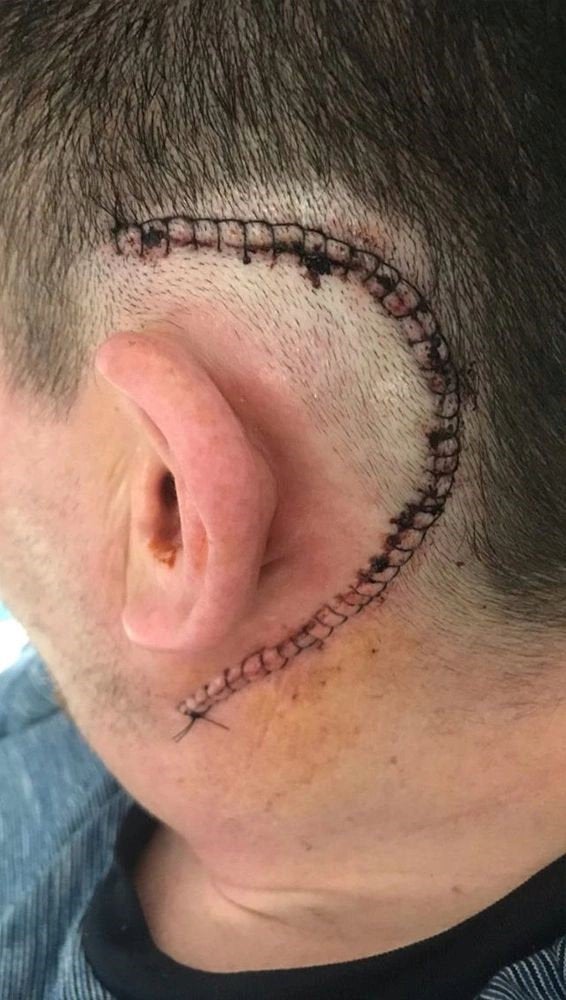
A professional boxer forced to give up his career after a brain tumour was missed by medics for six years told how he was determined to get his life back.
Dad-of-two Peter McDonagh, 45, collapsed at a service station in February 2019 after he stopped the car and started vomiting.
He was taken to hospital by ambulance, where he underwent a CT scan which identified a brain tumour near his left ear.
An MRI was performed, which identified a mass around 2.7cm by 2.7cm with surgeons removing most of the tumour before radiotherapy.
But Peter was devastated to be told the mass had been identified on scans in 2013 and 2017, which were carried out for him to renew his boxing licence.
Peter, from Leatherhead, Surrey, hoped to return to his old job as a fishmonger, but it was too unsafe due to issues he now has with balance.
He now suffers hearing loss, facial palsy, balance disturbance and psychological symptoms, and is plagued by ‘what ifs’ - but is looking forward to getting hitched.
Peter said: “Being diagnosed with a brain tumour was a huge shock to me as I’d been undergoing routine scans for many years so I would’ve expected anything abnormal to have been picked up in those.
“One of the main things I’ve struggled with as a result of the tumour is my ongoing symptoms and also having to give up my career.
“Boxing was a huge part of my life and I’ve found it really tough to come to terms with no longer being able to compete and do what I love.
“After my surgery, I tried to return to my pre-boxing trade of a fishmonger but I also had to give that up as I was unable to balance and the risk of getting hurt was too high.
“Since then, I get angry and upset sometimes when I think things may have been different if it the tumour been found sooner.
“However, I am on the road to recovery and try my best not to dwell on ‘what ifs’ and focus on my future.
The consultant neuroradiologist responsible for performing annual MRI screening on Peter as part of his boxing career, admitted that in 2013 and 2017 a brain tumour was visible on scans but wasn’t reported at the time, which “fell below a reasonable standard of care.”

It was also admitted that had it been reported, Peter would have undergone earlier treatment - but as it was missed it continued to grow from 2013 to 2019.
Peter collapsed on February 4 2019, when he stopped the car, vomited and fell to the ground.
After a CT scan was carried out, he went to A&E four days later complaining of dizziness, and was told the CT scan had found a tumour, which was also visible on a subsequent MRI scan.
Previous brain scans for his annual boxing licence were reassessed.
On March 12 2019, Peter underwent a 15-hour surgery with the aim of removing around 95 per cent of the tumour, leaving a small mass on the facial nerve to allow it to function properly.
He was discharged from hospital five days later, with a plan for six-monthly MRI scans.
On 15 March, 2021, radiotherapy was performed following growth of the residual tumour.
Two years on, Peter continues to be affected by problems with his hearing and balance, as well as occasional facial twitching and tingling, and he also struggles with his mental health.
Since retiring from boxing, Peter is now writing a book about his life and the day-to-day difficulties he faces.
He added: “While I would give anything to turn back the clock and change what’s happened, I know that’s not possible.
“All I can do now is work hard on my rehabilitation.
“I’ve had such great support and I’m determined to get my life back.
“I’ve even started writing a book and I hope that by sharing my story, I can show others that there’s help out there.”
Thomas Riis-Bristow, specialist medical negligence lawyer at Irwin Mitchell, said: “The last four years have been incredibly difficult for Peter, firstly being diagnosed with a brain tumour but then also having to give up a career he loved as a result.
“While he is making great progress with his recovery, he continues to struggle with a number of issues, both physically and emotionally, which have a significant impact on not only him but also his family.
“We therefore welcome the admission’s made which will help ensure Peter can benefit from the ongoing rehabilitation he needs to help him move forward with his life.
“As part of Action for Brain Injury Week, we join Peter in sharing his story to raise awareness of the help available. We’ll continue to support him as he continues with his recovery.”
Action for Brain Injury Week runs from May 15-21 and is supported by the charity Headway.







